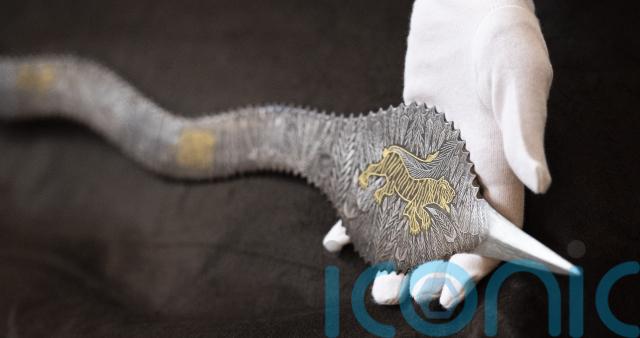
Artefacts taken from India in the 19th century will be returned from the Glasgow museum collection where they had been kept, following a repatriation agreement.
The items to be repatriated include a ceremonial Indo-Persian tulwar, a sword, which is believed to date back to the 14th century, and an 11th century carved stone door jamb taken from a Hindu temple in Kanpur.
Glasgow Life, the organisation which manages the city’s museum collections, on Friday welcomed dignitaries from the High Commission of India for a ceremony where they transferred ownership of the artefacts.
Duncan Dornan, head of museums and collections at Glasgow Life, said: “The transfer of ownership of the Indian antiquities symbolises a significant step for Glasgow, with the city continuing its positive repatriation history by ensuring these cultural artefacts are placed back in the hands of their legitimate owners.”
Glasgow Life Museums said it is the first museum service in the UK to repatriate artefacts to India.

Six of the objects were removed from temples and shrines in different states in northern India during the 19th century, while the seventh was purchased following a theft from the owner.
All seven artefacts were gifted to Glasgow’s collections.
Sujit Ghosh, acting Indian high commissioner, welcomed the return of the items.
“These artefacts are an integral part of our civilisational heritage and will now be sent back home,” he said.
“We express our appreciation to all the stakeholders who made this possible, especially Glasgow Life and Glasgow City Council.”
Glasgow Life Museums said it has been working on the repatriation of the artefacts, alongside the High Commission of India in London, since January 2021.
Bailie Annette Christie, the chairwoman of Glasgow Life, said: “The agreement reached with the government of India is another example of Glasgow’s commitment to addressing past wrongs and remaining transparent when explaining how objects arrived in the city’s museum collections.”
Glasgow is also set to return a number of other items to countries across the world, along with 19 bronzes to Nigeria.
This work has been ongoing since it was established that the artefacts – acquired as gifts, bequests and from auction houses – were taken from sacred sites and ceremonial buildings during the punitive Benin Expedition of 1897.
Some 25 Lakota and Oceti Sakowin ancestor and cultural items – sold and donated to Glasgow’s museums by George Crager, an interpreter for the Buffalo Bill Wild West Show who visited the city in 1892 – will also be handed back to the Cheyenne River Sioux and Oglala Sioux tribes of South Dakota.
Some of these objects were taken from the Wounded Knee Massacre site following the battle of December 1890, while others were personal items belonging to named ancestors or are ceremonial artefacts.
Subscribe or register today to discover more from DonegalLive.ie
Buy the e-paper of the Donegal Democrat, Donegal People's Press, Donegal Post and Inish Times here for instant access to Donegal's premier news titles.
Keep up with the latest news from Donegal with our daily newsletter featuring the most important stories of the day delivered to your inbox every evening at 5pm.